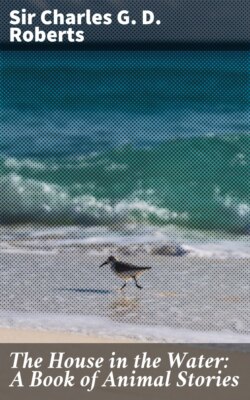Читать книгу The House in the Water: A Book of Animal Stories - Sir Charles G. D. Roberts - Страница 5
На сайте Литреса книга снята с продажи.
CHAPTER III
In the Under-water World
ОглавлениеTable of Contents
MEANWHILE, in the dark chamber and the long, dim corridors of the House in the Water there was great perturbation. The battle with the otter had been a tremendous episode in their industrious, well-ordered lives, and they were wildly excited over it. But much more important to them––to all but the big beaver who was now nursing his triumphant wounds––was the presence of Man in their solitude. Man had hitherto been but a tradition among them, a vague but alarming tradition. And now his appearance, yesterday and to-day, filled them with terror. That vision of the Boy, standing tall and ominous on the dam, and afterwards going forward and backward over it, pulling at it, apparently seeking to destroy it, seemed to portend mysterious disasters. After he was gone, and well gone, almost every beaver in the pond, not only from the main house but also 30 from the lodge over on the bank, swam down and made a flurried inspection of the dam, without showing his head above water, to see if the structure on which they all depended had been tampered with. One by one, each on his own responsibility, they swam down and inspected the water-face; and one by one they swam back, more or less relieved in their minds.
All, of course, except the big beaver who had been in the fight. If it had not been for that vision of the Boy, he would have crept out upon the dry grass of the little island and there licked and comforted his wounds in the comforting sunlight. Now, however, he dared not allow himself that luxury. His strong love of cleanliness made him reluctant to take his bleeding gashes into the house; but there was nothing else to be done. He was the head of the household, however, so there was none to gainsay him. He dived into the mouth of the shorter of the two entrances, mounted the crooked and somewhat steep passage, and curled himself upon the dry grass in one corner of the dark, secluded chamber. His hurts were painful, and ugly, but none of them deadly, and he knew he would soon be all right again. There was none 31 of that foreknowledge of death upon him which sometimes drives a sick animal to abdicate his rights and crawl away by himself for the last great contest.
The room wherein the big beaver lay down to recover himself was not spacious nor particularly well ventilated, but in every other respect it was very admirably adapted to the needs of its occupants. Through the somewhat porous ceiling, a three-foot thickness of turf and sticks, came a little air, but no light. This, however, did not matter to the beavers, whose ears and noses were of more significance to them than their eyes. In floor area the chamber was something like five feet by six and a half, but in height not much more than eighteen inches. The floor of this snug retreat was not five inches above the level of the water in the passages leading in to it; but so excellently was it constructed as to be altogether free from damp. It was daintily clean, moreover; and the beds of dry grass around the edges of the chamber were clean and fresh.
From this room the living, sleeping, and dining room of the beaver family, ran two passageways communicating with the outside world. Both of these were roofed over to a point well outside the 32 walls of the house, and had their opening in the bottom of the pond, where the water was considerably more than three feet in depth. One of these passages was perfectly straight, about two feet in width, and built on a long, gradual slope. It was by this entrance that the house-dwellers were wont to bring in their food supplies, in the shape of sticks of green willow, birch and poplar. When these sticks were stripped clean of their bark, which was the beavers’ chief nourishment, they were then dragged out again, and floated down to be used in the repair of the dam. The other passage, especially adapted to quick exit in case of danger from the way of the roof, was about as spacious as the first, but much shorter and steeper. It was crooked, moreover,––for a reason doubtless adequate to the architects, but obscure to mere human observers. The exits of both passages were always in open water, no matter how fierce the frosts of the winter, how thick the armour of ice over the surface of the pond. In the neighbourhood of the house were springs bubbling up through the bottom, and keeping the temperature of the pond fairly uniform throughout the coldest weather, so that the ice, at worst, never attained a thickness of more than a foot and a half, even though in the bigger lakes of that region it might make to a depth of three feet and over.
